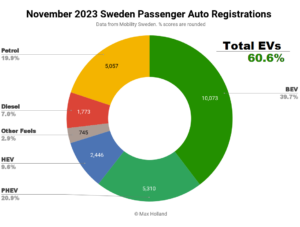It’s a well-known problem: people who fall deep into the pit of drug addiction often can’t keep a job or other gainful activities going. But, when they run out of money, they can’t give up the drugs. So, their dealer proposes a solution: go get some valuables instead!
I’ve seen this play out in my own neighborhood. One of my neighbors has a major mental disability caused by sniffing glue as a teenager. Now, he’s a 58-year-old man with the mental capacity of a 5-year-old and the attention span of a goldfish. Unable to find normal friends, the man became friends with homeless people, who now take advantage of him.
Now, they’re all addicted to fentanyl, and they roam half the town looking for things to steal. They don’t think anybody notices, but they’re always coming and going with black bags, and people on this side of town have caught them on security cameras stuffing stolen items into the bags. Once or twice a day, their fence shows up in a truck, taking the stolen goods and delivering fentanyl.
This goes on all over the United States, but it’s starting to become a problem not only for the people who get snared in addiction and this form of serfdom, but for the environment. (article continues after embedded video)
[embedded content]
Copper is a valuable commodity. Big, thick wires are more valuable because they contain more copper. Things like extension cords and Christmas lights are good sources of it, but for an enterprising crackhead, it probably doesn’t take long to realize that EVs are charged with some of the bigger and thicker wires out there. So, naturally, police departments are seeing thefts of EV charging cables go up as addiction rises.
For most people, the cost savings of driving an economical EV wouldn’t last very long if they had to buy a new cable or EVSE every week or two, so this is an issue that really could end up affecting the whole industry. Crackheads will also steal gas from ICE vehicles, but that’s easier to stop in many cases (locking gas caps, locking gas doors, etc). But, this is probably the electric equivalent to catalytic converter theft.
Ways To Protect Yourself From This Theft
This doesn’t mean the situation is hopeless. There are ways to protect your vehicle.
First off, many EVs have a setting or two to defend against charging cable theft. You’ll need to consult your owner’s manual to figure out the exact steps, but somewhere in the menu you’ll probably find settings for a cord theft alarm and/or locking of the cable until you unlock the car. Enabling either of these settings can help prevent theft by making a loud noise if continuity is lost or the cable is unplugged.
It’s also often possible to get an alert to your smartphone in the event the EV is unplugged.
Another key thing you can do is add surveillance to your driveway, assuming you’re not already parking in an enclosed garage or an apartment complex. In my case, I have an internet-connected camera watching my driveway, and I’ve taken some other steps that make sure the local crackheads know that stealing from me is bad for their long and short-term health. So far, they’ve stayed out of my driveway.
The U.S. Needs To Solve The Root Of This Problem
Honestly, this is a problem that EV drivers in the United States shouldn’t be dealing with, nor is it a problem that the addicts themselves should be dealing with. I actually feel bad for the homeless, addicted people who live down the street in a house that’s not theirs. I don’t like having to do things to make them fear me. I’m not the kind of sick person who derives any joy from it, but I have to protect my family.
The sad fact is that these people are victims of decades of bad public policy.
First off, let’s be clear that the War on Drugs has failed, and more spectacularly than Prohibition. The misguided Progressive Era ban on alcohol only lasted 13 years before everyone figured out that it was utter trash. Today, we still live with a lot of alcohol-fueled problems in society, but the Bud Light driver and the Coors driver aren’t shooting at each other with Thompson submachine guns and spraying whole neighborhoods with .45 ACP like Elon Musk would a Cybertruck.
But, the War on Drugs has been going for over 50 years now. Instead of well-dressed men firing slow bullets at each other, now we’ve got a worldwide bazaar of violence. Ciudad Juarez, a city just down the road from me, was the most dangerous city on the planet for a few years, even beating out Iraq during the worst fighting of the War on Terror.
One big driver of the violence and deadly nature of the drugs is what Richard Cowan calls The Iron Law Of Prohibition. You’ve probably noticed that the harder authorities push against problem drugs, the worse things seem to get. And, conversely, you’ve probably seen the violence drop when a drug gets legalized.
It’s really a simple matter of economics. Drive the cost of transportation up (through harder enforcement) and the black market will naturally switch to increasingly potent drugs to make smuggling easier. We’ve gone from weed (mostly harmless) to cocaine, to crack, then to opioids, and now we’re at fentanyl. I dread to think of what comes after fentanyl, because it’s really screwing people up.
But, there’s another way out: connection. The idea that people living a healthy and happy life can become addicts is a lie. Portugal and other countries have proven that the “tough on crime” approach doesn’t stop addiction, but helping the addicts does.
We know that putting a rat in an empty cage with drugs (like the old anti-drug PSA) leads to addiction and death. But, rats put in a good environment hardly use drugs, even when they’re available. Accidental experiments, like hospital stays and even the Vietnam War prove that people who go back to a good life don’t stay addicted to drugs.
You can learn a lot more about that in this TED talk:
[embedded content]
Featured image by Jennifer Sensiba.
Have a tip for CleanTechnica? Want to advertise? Want to suggest a guest for our CleanTech Talk podcast? Contact us here.
CleanTechnica Holiday Wish Book

Our Latest EVObsession Video
[embedded content]I don't like paywalls. You don't like paywalls. Who likes paywalls? Here at CleanTechnica, we implemented a limited paywall for a while, but it always felt wrong — and it was always tough to decide what we should put behind there. In theory, your most exclusive and best content goes behind a paywall. But then fewer people read it!! So, we've decided to completely nix paywalls here at CleanTechnica. But...
Thank you!
Advertisement
CleanTechnica uses affiliate links. See our policy here.
- SEO Powered Content & PR Distribution. Get Amplified Today.
- PlatoData.Network Vertical Generative Ai. Empower Yourself. Access Here.
- PlatoAiStream. Web3 Intelligence. Knowledge Amplified. Access Here.
- PlatoESG. Carbon, CleanTech, Energy, Environment, Solar, Waste Management. Access Here.
- PlatoHealth. Biotech and Clinical Trials Intelligence. Access Here.
- Source: https://cleantechnica.com/2023/12/03/crackheads-are-stealing-ev-charging-cords-for-copper-we-need-to-help-them-stop-doing-this/
- :has
- :is
- :not
- $UP
- 13
- 15%
- 36
- 50
- 50 Years
- a
- About
- accidental
- ACP
- activities
- actually
- add
- addiction
- ADvantage
- Advertise
- affecting
- Affiliate
- After
- against
- alarm
- Alcohol
- Alert
- All
- already
- also
- always
- an
- and
- Another
- any
- Apartment
- approach
- ARE
- article
- AS
- At
- attention
- Authorities
- available
- back
- Bad
- bags
- Ban
- BE
- became
- because
- become
- been
- before
- behind
- BEST
- Big
- bigger
- Bit
- Black
- book
- but
- buy
- by
- cable
- cables
- Calls
- camera
- cameras
- CAN
- Capacity
- caps
- car
- case
- cases
- caught
- caused
- charged
- charging
- chip
- Christmas
- City
- cleantech
- Cleantech Talk
- clear
- cocaine
- comes
- coming
- commodity
- Companies
- completely
- complex
- connection
- contain
- content
- continues
- continuity
- conversely
- Copper
- Cost
- cost savings
- could
- countries
- cover
- crack
- cybertruck
- Dangerous
- day
- dealer
- dealing
- Death
- decades
- decide
- decided
- deep
- delivering
- departments
- Disability
- do
- does
- Doesn’t
- doing
- don
- Dont
- doors
- down
- drive
- driver
- drivers
- driving
- Drop
- drug
- Drugs
- during
- each
- easier
- Economics
- either
- Electric
- Elon
- Elon Musk
- embedded
- empty
- enabling
- end
- enforcement
- enterprising
- Environment
- Equivalent
- Era
- etc
- EV
- Even
- Event
- Every
- everyone
- everything
- evs
- Exclusive
- experiments
- extension
- fact
- Failed
- Fall
- family
- far
- fear
- feel
- felt
- fentanyl
- few
- fewer
- fighting
- Figure
- figured
- Find
- firing
- For
- form
- friends
- from
- garage
- GAS
- get
- Give
- Go
- Goes
- going
- gone
- good
- goods
- got
- Guest
- GUNS
- had
- Half
- happy
- harder
- Have
- having
- Health
- healthy
- help
- helping
- here
- him
- Holiday
- homeless
- Hospital
- House
- HTTPS
- i
- ICE
- idea
- if
- image
- implemented
- in
- increasingly
- industry
- instead
- internet-connected
- into
- iraq
- issue
- IT
- items
- Jennifer
- Job
- joy
- just
- Keep
- Key
- Kind
- Know
- Last
- latest
- Law
- Leads
- LEARN
- legalized
- lie
- Life
- light
- like
- likes
- Limited
- links
- live
- living
- local
- Long
- looking
- lost
- Lot
- loud
- major
- make
- Making
- man
- manual
- many
- Market
- Matter
- max-width
- me
- mean
- Media
- Men
- mental
- Menu
- money
- more
- most
- mostly
- Musk
- my
- Nature
- Need
- needs
- neighbors
- New
- new target
- news
- Noise
- nor
- normal
- now
- of
- off
- often
- Old
- on
- once
- ONE
- only
- opioids
- or
- Other
- our
- out
- over
- own
- parking
- People
- person
- PIT
- planet
- plato
- Plato Data Intelligence
- PlatoData
- Play
- player
- podcast
- Police
- policy
- Portugal
- possible
- potent
- prevent
- probably
- Problem
- problems
- progressive
- Prohibition
- proposes
- protect
- Prove
- proven
- public
- publish
- Push
- put
- Putting
- RAT
- Read
- Reader
- realize
- really
- Richard
- Rises
- road
- root
- Run
- s
- Savings
- security
- see
- seeing
- seem
- seen
- setting
- settings
- shooting
- short-term
- should
- Shows
- side
- Simple
- situation
- slow
- smartphone
- So
- so Far
- Society
- solution
- SOLVE
- some
- somewhere
- Sources
- span
- Starting
- States
- stay
- stayed
- Steps
- Still
- stolen
- Stop
- Stories
- street
- stuffing
- suggest
- support
- sure
- surveillance
- Switch
- T
- Take
- taken
- taking
- Talk
- Target
- team
- Ted
- teenager
- than
- that
- The
- theft
- thefts
- their
- Them
- themselves
- then
- theory
- There.
- These
- they
- thing
- things
- think
- this
- thompson
- Through
- tip
- to
- today
- tough
- town
- transportation
- truck
- Twice
- two
- u.s.
- unable
- United
- United States
- unlock
- until
- Updates
- us
- use
- uses
- Valuable
- Ve
- vehicle
- Vehicles
- very
- victims
- Video
- Vietnam
- want
- war
- was
- washington
- watching
- Way..
- ways
- we
- weed
- week
- well-known
- What
- when
- while
- WHO
- whole
- Wikipedia
- will
- with
- worldwide
- worse
- Worst
- would
- write
- Wrong
- years
- you
- Your
- yourself
- youtube
- zephyrnet






